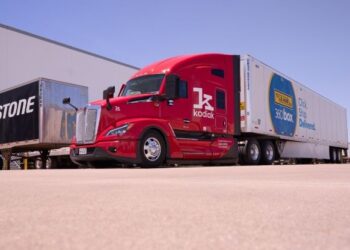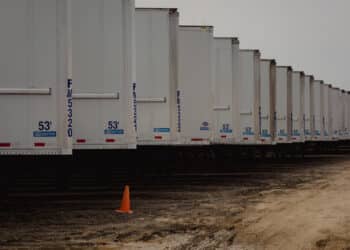Tariffs pressure commercial truck dealers
S&P Global Mobility predicts new truck prices could jump 9%
Commercial truck dealers and manufacturers are looking for solutions in the face of potential price increases under increased tariff activity.
Custom Truck One Source, for example, views its $1 billion in new inventory backlog and $1.5 billion in rental fleet assets as the two largest hedges against the impact of tariffs, Ryan McMonagle, chief executive of the Kansas City, Mo.-based commercial truck dealer, said March 11 during the J.P Morgan Industrials Conference.
While Custom Truck One Source believes its backlog can overcome the short-term effects of tariffs, the long-term costs present a different problem, McMonagle said.
“If it all were to be subject to tariff, there would be several hundred million dollars of incremental costs associated with that,” he said. “In some cases, we’ve already made commitments on volume for the balance of the year, and in exchange have been able to ensure that we won’t see any price increase from tariffs, so we’re working that way with each of our suppliers.”
Custom Truck One Source also views its supplier relationships as key to its tariffs strategy, McMonagle said.
“We’re working through it with each supplier individually and we think we have a good plan in place,” he said.
Commercial truck manufacturer Traton Group expects tariffs to affect truck-related goods, despite having a mitigation plan, Chief Financial Officer and Chief Human Resources Officer Michael Jackstein, said during the company’s March 10 earnings call.
“Tariffs generally can have a significant impact on the price of goods used to produce trucks,” he said. “For short-lived tariffs, we have mitigation measures in place, so here, we see no significant short-term impacts on our financials.”
Fellow commercial truck dealer Rush Enterprises believes the increased prices related to tariffs could lower demand for vehicles and parts, Chief Executive W.M. “Rusty” Rush said during the company’s Feb. 18 earnings call.
Truck prices in the United States would rise around 9% as part of the impact of tariffs, S&P Global Mobility estimated in a Feb. 10 release.
“With almost half of U.S. Class 8 heavy truck sales produced in Mexico, all else equal, 25% tariffs would influence trucking imports and exports as well as manufacturing, pricing, profitability and volume,” the release stated.
“Combined with the immediate retaliatory actions of Canada and Mexico, the tariffs’ impact on the trucking industry could be significant, with the potential to depress near-term truck volumes and, over time, reshape commercial vehicle manufacturing.”
The third annual Equipment Finance Connect at the JW Marriott Nashville on May 14-15, 2025, is the only event for both equipment dealers and finance providers. Learn more and register here.









